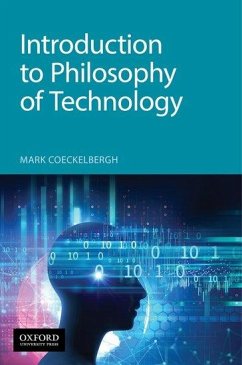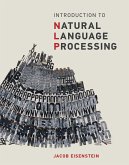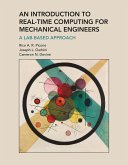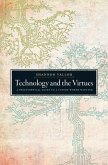Mark Coeckelbergh
Introduction to Philosophy of Technology
Mark Coeckelbergh
Introduction to Philosophy of Technology
- Broschiertes Buch
Andere Kunden interessierten sich auch für
![Bentham's an Introduction to the Principles of Morals and Legislation Bentham's an Introduction to the Principles of Morals and Legislation]() Steven Sverdlik (Professor of Philosophy, Professor of Philosophy,Bentham's an Introduction to the Principles of Morals and Legislation37,99 €
Steven Sverdlik (Professor of Philosophy, Professor of Philosophy,Bentham's an Introduction to the Principles of Morals and Legislation37,99 €![Introduction to Natural Language Processing Introduction to Natural Language Processing]() Jacob Eisenstein (Google Assistant Professor)Introduction to Natural Language Processing87,99 €
Jacob Eisenstein (Google Assistant Professor)Introduction to Natural Language Processing87,99 €![Introduction to Real-Time Computing for Mechanical Engineers, An Introduction to Real-Time Computing for Mechanical Engineers, An]() Rico A. R. PiconeIntroduction to Real-Time Computing for Mechanical Engineers, An86,99 €
Rico A. R. PiconeIntroduction to Real-Time Computing for Mechanical Engineers, An86,99 €![An Introduction to Middle English An Introduction to Middle English]() Simon Horobin (Lecturer in English La Lecturer in English LanguageAn Introduction to Middle English33,99 €
Simon Horobin (Lecturer in English La Lecturer in English LanguageAn Introduction to Middle English33,99 €![Technology and the Virtues Technology and the Virtues]() Shannon Vallor (S.J S.J. Professor in the Department of PhilosophyTechnology and the Virtues91,99 €
Shannon Vallor (S.J S.J. Professor in the Department of PhilosophyTechnology and the Virtues91,99 €![The Women Are Up to Something The Women Are Up to Something]() Benjamin J.B. Lipscomb (Professor of Philosophy and Director of theThe Women Are Up to Something39,99 €
Benjamin J.B. Lipscomb (Professor of Philosophy and Director of theThe Women Are Up to Something39,99 €![Duty to Resist Duty to Resist]() Candice Delmas (Assistant Professor of Philosophy and Political SciDuty to Resist45,99 €
Candice Delmas (Assistant Professor of Philosophy and Political SciDuty to Resist45,99 €-
-
-
Produktdetails
- Verlag: Oxford University Press Inc
- Seitenzahl: 336
- Erscheinungstermin: 14. November 2020
- Englisch
- Abmessung: 234mm x 156mm x 18mm
- Gewicht: 478g
- ISBN-13: 9780190939809
- ISBN-10: 019093980X
- Artikelnr.: 61245200
Hinweis: Dieser Artikel kann nur an eine deutsche Lieferadresse ausgeliefert werden.
- Herstellerkennzeichnung
- Libri GmbH
- Europaallee 1
- 36244 Bad Hersfeld
- gpsr@libri.de
Mark Coeckelbergh is Professor of Media and Technology in the Department of Philosophy at the University of Vienna and was also President of the Society for Philosophy and Technology. He is the author of twelve books and a member of the High Level Expert Group on AI of the European Commission.
* PART 1. INTRODUCTION: PHILOSOPHY OF TECHNOLOGY?
* 1. Introduction
*
* 1.1. Thinking about Technology?
* 1.2. Approach, Structure of the Book, and Overview of Chapters
* 2. History and Landscape
*
* 2.1. Beginnings: Two Ancient Myths
*
* 2.2. A Brief History of the Discipline
*
* 2.3. Historical Context, Landscape of the Discipline, and Critical
Questions
*
*
* PART 2. THINKING ABOUT TECHNOLOGY BY STARTING FROM THEORY
* 3. Phenomenology and Hermeneutics: Heidegger, McLuhan, and
Contemporary Work
*
* 3.1. Heidegger's Essay Concerning Technology: Beyond an Instrumental
Understanding of Technology
*
* 3.2. McLuhan's Understanding of Media
*
*
*
* 3.3. Some Contemporary Work in Phenomenology and Hermeneutics of
Technology
*
*
* 4. Postphenomenology, Material Hermeneutics, and Mediation Theory
*
* 4.1. Introduction: The Empirical Turn
* 4.2. Ihde's Postphenomenology and Material Hermeneutics
*
*
* 4.3. Contemporary Postphenomenology and Mediation Theory
*
*
* 4.4. Critical Discussion
* 5. Critical Theory and Feminism
*
* 5.1. Marx: Political Economy and Technology
*
* 5.2. Marx 2.0.: Social media and Exploitation
*
* 5.3. Critical Theory about Technology Beyond Marx: From Marcuse and
Foucault to Feenberg and Winner
*
*
*
*
*
* 5.4. Feminist Thinking about Technology
*
*
* 5.5. Critical Discussion
* 6. Pragmatism, Analytic Approaches, and Transcultural Philosophy
*
* 6.1. Pragmatism
*
* 6.2. Analytic Philosophy of Technology
*
*
* 6.3. Intercultural and Transcultural Philosophy of Technology?
*
*
* PART 3 . THINKING ABOUT TECHNOLOGY BY STARTING FROM TECHNOLOGY
* 7. From Information Technologies to Philosophy and Ethics of
Information
*
* 7.1. Introduction
*
* 7.2. All about Information: Floridi's Philosophy and Ethics of
Information
*
* 7.3. Critical Discussion
* 7.4. Conclusions for Philosophy of Technology
* 8. From Robotics and AI to Thinking about Moral Status and Human
Relationships
*
* 8.1. Introduction
* 8.2. Moral Machines? The Discussion about Moral Agency
*
* 8.3. The Discussion about Moral Patiency
* 8.4. Changing the Question: Toward More Relational Thinking
*
* 8.5. The Debate about Sex Robots and Human Relationships: Feminist
(or Egalitarian) Questions
*
* 8.6. Humans, Non-Humans, and the More-Than-Human
* 9. From Genetic Engineering and Cyborgs to Transhumanism and
Posthumanism
*
* 9.1. Introduction
* 9.2. Transhumanism and Human Enhancement
* 9.3. Posthumanism and Cyborgs
*
*
*
* 10. From Climate Change and Geoengineering to Questioning "Nature"
and Thinking in and about the "Anthropocene"
*
* 10.1. Introduction: Earth, We Have a Problem
* 10.2. The Problem With "Nature": Modern Versus Non-Modern Approaches
*
* 10.3. The Anthropocene: Some Philosophical Responses
* PART 4. THINKING ABOUT TECHNOLOGY BY GOING BEYOND PHILOSOPHY OF
TECHNOLOGY (PHILOSOPHY OF TECHNOLOGY +)
* 11. Philosophy of Technology and Other Philosophy: (Re)Connecting
with Other Philosophical Subdisciplines
*
* 11.1. Introduction
* 11.2. Ethics and Moral Philosophy: Thinking about Virtue and Thinking
about Technology
* 11.3. Philosophical Anthropology: Thinking about the Human and
Thinking about Technology
*
* 11.4. Philosophy of Language: Thinking about Language and Thinking
about Technology
*
*
* 11.5. Other Subfields: Some Examples
* 11.6. Conclusions for Philosophers of Technology
* 12. Philosophy of Technology and Other Academic Disciplines:
Interdisciplinarity and Transdisciplinarity
*
* 12.1. Introduction
* 12.2. Some Examples of Transdisciplinary Work for Philosophers of
Technology
*
*
*
* 12.3. Challenges for Transdisciplinary Work
* 13. Philosophy of Technology and Other Practices Beyond Academia
*
* 13.1. Beyond Academia: Innovation, Policy, and Art
*
*
*
* 13.2. Some Directions and Recommendations Concerning the Future of
Research in Philosophy of Technology and Its Potential Implications
for Education
* 1. Introduction
*
* 1.1. Thinking about Technology?
* 1.2. Approach, Structure of the Book, and Overview of Chapters
* 2. History and Landscape
*
* 2.1. Beginnings: Two Ancient Myths
*
* 2.2. A Brief History of the Discipline
*
* 2.3. Historical Context, Landscape of the Discipline, and Critical
Questions
*
*
* PART 2. THINKING ABOUT TECHNOLOGY BY STARTING FROM THEORY
* 3. Phenomenology and Hermeneutics: Heidegger, McLuhan, and
Contemporary Work
*
* 3.1. Heidegger's Essay Concerning Technology: Beyond an Instrumental
Understanding of Technology
*
* 3.2. McLuhan's Understanding of Media
*
*
*
* 3.3. Some Contemporary Work in Phenomenology and Hermeneutics of
Technology
*
*
* 4. Postphenomenology, Material Hermeneutics, and Mediation Theory
*
* 4.1. Introduction: The Empirical Turn
* 4.2. Ihde's Postphenomenology and Material Hermeneutics
*
*
* 4.3. Contemporary Postphenomenology and Mediation Theory
*
*
* 4.4. Critical Discussion
* 5. Critical Theory and Feminism
*
* 5.1. Marx: Political Economy and Technology
*
* 5.2. Marx 2.0.: Social media and Exploitation
*
* 5.3. Critical Theory about Technology Beyond Marx: From Marcuse and
Foucault to Feenberg and Winner
*
*
*
*
*
* 5.4. Feminist Thinking about Technology
*
*
* 5.5. Critical Discussion
* 6. Pragmatism, Analytic Approaches, and Transcultural Philosophy
*
* 6.1. Pragmatism
*
* 6.2. Analytic Philosophy of Technology
*
*
* 6.3. Intercultural and Transcultural Philosophy of Technology?
*
*
* PART 3 . THINKING ABOUT TECHNOLOGY BY STARTING FROM TECHNOLOGY
* 7. From Information Technologies to Philosophy and Ethics of
Information
*
* 7.1. Introduction
*
* 7.2. All about Information: Floridi's Philosophy and Ethics of
Information
*
* 7.3. Critical Discussion
* 7.4. Conclusions for Philosophy of Technology
* 8. From Robotics and AI to Thinking about Moral Status and Human
Relationships
*
* 8.1. Introduction
* 8.2. Moral Machines? The Discussion about Moral Agency
*
* 8.3. The Discussion about Moral Patiency
* 8.4. Changing the Question: Toward More Relational Thinking
*
* 8.5. The Debate about Sex Robots and Human Relationships: Feminist
(or Egalitarian) Questions
*
* 8.6. Humans, Non-Humans, and the More-Than-Human
* 9. From Genetic Engineering and Cyborgs to Transhumanism and
Posthumanism
*
* 9.1. Introduction
* 9.2. Transhumanism and Human Enhancement
* 9.3. Posthumanism and Cyborgs
*
*
*
* 10. From Climate Change and Geoengineering to Questioning "Nature"
and Thinking in and about the "Anthropocene"
*
* 10.1. Introduction: Earth, We Have a Problem
* 10.2. The Problem With "Nature": Modern Versus Non-Modern Approaches
*
* 10.3. The Anthropocene: Some Philosophical Responses
* PART 4. THINKING ABOUT TECHNOLOGY BY GOING BEYOND PHILOSOPHY OF
TECHNOLOGY (PHILOSOPHY OF TECHNOLOGY +)
* 11. Philosophy of Technology and Other Philosophy: (Re)Connecting
with Other Philosophical Subdisciplines
*
* 11.1. Introduction
* 11.2. Ethics and Moral Philosophy: Thinking about Virtue and Thinking
about Technology
* 11.3. Philosophical Anthropology: Thinking about the Human and
Thinking about Technology
*
* 11.4. Philosophy of Language: Thinking about Language and Thinking
about Technology
*
*
* 11.5. Other Subfields: Some Examples
* 11.6. Conclusions for Philosophers of Technology
* 12. Philosophy of Technology and Other Academic Disciplines:
Interdisciplinarity and Transdisciplinarity
*
* 12.1. Introduction
* 12.2. Some Examples of Transdisciplinary Work for Philosophers of
Technology
*
*
*
* 12.3. Challenges for Transdisciplinary Work
* 13. Philosophy of Technology and Other Practices Beyond Academia
*
* 13.1. Beyond Academia: Innovation, Policy, and Art
*
*
*
* 13.2. Some Directions and Recommendations Concerning the Future of
Research in Philosophy of Technology and Its Potential Implications
for Education
* PART 1. INTRODUCTION: PHILOSOPHY OF TECHNOLOGY?
* 1. Introduction
*
* 1.1. Thinking about Technology?
* 1.2. Approach, Structure of the Book, and Overview of Chapters
* 2. History and Landscape
*
* 2.1. Beginnings: Two Ancient Myths
*
* 2.2. A Brief History of the Discipline
*
* 2.3. Historical Context, Landscape of the Discipline, and Critical
Questions
*
*
* PART 2. THINKING ABOUT TECHNOLOGY BY STARTING FROM THEORY
* 3. Phenomenology and Hermeneutics: Heidegger, McLuhan, and
Contemporary Work
*
* 3.1. Heidegger's Essay Concerning Technology: Beyond an Instrumental
Understanding of Technology
*
* 3.2. McLuhan's Understanding of Media
*
*
*
* 3.3. Some Contemporary Work in Phenomenology and Hermeneutics of
Technology
*
*
* 4. Postphenomenology, Material Hermeneutics, and Mediation Theory
*
* 4.1. Introduction: The Empirical Turn
* 4.2. Ihde's Postphenomenology and Material Hermeneutics
*
*
* 4.3. Contemporary Postphenomenology and Mediation Theory
*
*
* 4.4. Critical Discussion
* 5. Critical Theory and Feminism
*
* 5.1. Marx: Political Economy and Technology
*
* 5.2. Marx 2.0.: Social media and Exploitation
*
* 5.3. Critical Theory about Technology Beyond Marx: From Marcuse and
Foucault to Feenberg and Winner
*
*
*
*
*
* 5.4. Feminist Thinking about Technology
*
*
* 5.5. Critical Discussion
* 6. Pragmatism, Analytic Approaches, and Transcultural Philosophy
*
* 6.1. Pragmatism
*
* 6.2. Analytic Philosophy of Technology
*
*
* 6.3. Intercultural and Transcultural Philosophy of Technology?
*
*
* PART 3 . THINKING ABOUT TECHNOLOGY BY STARTING FROM TECHNOLOGY
* 7. From Information Technologies to Philosophy and Ethics of
Information
*
* 7.1. Introduction
*
* 7.2. All about Information: Floridi's Philosophy and Ethics of
Information
*
* 7.3. Critical Discussion
* 7.4. Conclusions for Philosophy of Technology
* 8. From Robotics and AI to Thinking about Moral Status and Human
Relationships
*
* 8.1. Introduction
* 8.2. Moral Machines? The Discussion about Moral Agency
*
* 8.3. The Discussion about Moral Patiency
* 8.4. Changing the Question: Toward More Relational Thinking
*
* 8.5. The Debate about Sex Robots and Human Relationships: Feminist
(or Egalitarian) Questions
*
* 8.6. Humans, Non-Humans, and the More-Than-Human
* 9. From Genetic Engineering and Cyborgs to Transhumanism and
Posthumanism
*
* 9.1. Introduction
* 9.2. Transhumanism and Human Enhancement
* 9.3. Posthumanism and Cyborgs
*
*
*
* 10. From Climate Change and Geoengineering to Questioning "Nature"
and Thinking in and about the "Anthropocene"
*
* 10.1. Introduction: Earth, We Have a Problem
* 10.2. The Problem With "Nature": Modern Versus Non-Modern Approaches
*
* 10.3. The Anthropocene: Some Philosophical Responses
* PART 4. THINKING ABOUT TECHNOLOGY BY GOING BEYOND PHILOSOPHY OF
TECHNOLOGY (PHILOSOPHY OF TECHNOLOGY +)
* 11. Philosophy of Technology and Other Philosophy: (Re)Connecting
with Other Philosophical Subdisciplines
*
* 11.1. Introduction
* 11.2. Ethics and Moral Philosophy: Thinking about Virtue and Thinking
about Technology
* 11.3. Philosophical Anthropology: Thinking about the Human and
Thinking about Technology
*
* 11.4. Philosophy of Language: Thinking about Language and Thinking
about Technology
*
*
* 11.5. Other Subfields: Some Examples
* 11.6. Conclusions for Philosophers of Technology
* 12. Philosophy of Technology and Other Academic Disciplines:
Interdisciplinarity and Transdisciplinarity
*
* 12.1. Introduction
* 12.2. Some Examples of Transdisciplinary Work for Philosophers of
Technology
*
*
*
* 12.3. Challenges for Transdisciplinary Work
* 13. Philosophy of Technology and Other Practices Beyond Academia
*
* 13.1. Beyond Academia: Innovation, Policy, and Art
*
*
*
* 13.2. Some Directions and Recommendations Concerning the Future of
Research in Philosophy of Technology and Its Potential Implications
for Education
* 1. Introduction
*
* 1.1. Thinking about Technology?
* 1.2. Approach, Structure of the Book, and Overview of Chapters
* 2. History and Landscape
*
* 2.1. Beginnings: Two Ancient Myths
*
* 2.2. A Brief History of the Discipline
*
* 2.3. Historical Context, Landscape of the Discipline, and Critical
Questions
*
*
* PART 2. THINKING ABOUT TECHNOLOGY BY STARTING FROM THEORY
* 3. Phenomenology and Hermeneutics: Heidegger, McLuhan, and
Contemporary Work
*
* 3.1. Heidegger's Essay Concerning Technology: Beyond an Instrumental
Understanding of Technology
*
* 3.2. McLuhan's Understanding of Media
*
*
*
* 3.3. Some Contemporary Work in Phenomenology and Hermeneutics of
Technology
*
*
* 4. Postphenomenology, Material Hermeneutics, and Mediation Theory
*
* 4.1. Introduction: The Empirical Turn
* 4.2. Ihde's Postphenomenology and Material Hermeneutics
*
*
* 4.3. Contemporary Postphenomenology and Mediation Theory
*
*
* 4.4. Critical Discussion
* 5. Critical Theory and Feminism
*
* 5.1. Marx: Political Economy and Technology
*
* 5.2. Marx 2.0.: Social media and Exploitation
*
* 5.3. Critical Theory about Technology Beyond Marx: From Marcuse and
Foucault to Feenberg and Winner
*
*
*
*
*
* 5.4. Feminist Thinking about Technology
*
*
* 5.5. Critical Discussion
* 6. Pragmatism, Analytic Approaches, and Transcultural Philosophy
*
* 6.1. Pragmatism
*
* 6.2. Analytic Philosophy of Technology
*
*
* 6.3. Intercultural and Transcultural Philosophy of Technology?
*
*
* PART 3 . THINKING ABOUT TECHNOLOGY BY STARTING FROM TECHNOLOGY
* 7. From Information Technologies to Philosophy and Ethics of
Information
*
* 7.1. Introduction
*
* 7.2. All about Information: Floridi's Philosophy and Ethics of
Information
*
* 7.3. Critical Discussion
* 7.4. Conclusions for Philosophy of Technology
* 8. From Robotics and AI to Thinking about Moral Status and Human
Relationships
*
* 8.1. Introduction
* 8.2. Moral Machines? The Discussion about Moral Agency
*
* 8.3. The Discussion about Moral Patiency
* 8.4. Changing the Question: Toward More Relational Thinking
*
* 8.5. The Debate about Sex Robots and Human Relationships: Feminist
(or Egalitarian) Questions
*
* 8.6. Humans, Non-Humans, and the More-Than-Human
* 9. From Genetic Engineering and Cyborgs to Transhumanism and
Posthumanism
*
* 9.1. Introduction
* 9.2. Transhumanism and Human Enhancement
* 9.3. Posthumanism and Cyborgs
*
*
*
* 10. From Climate Change and Geoengineering to Questioning "Nature"
and Thinking in and about the "Anthropocene"
*
* 10.1. Introduction: Earth, We Have a Problem
* 10.2. The Problem With "Nature": Modern Versus Non-Modern Approaches
*
* 10.3. The Anthropocene: Some Philosophical Responses
* PART 4. THINKING ABOUT TECHNOLOGY BY GOING BEYOND PHILOSOPHY OF
TECHNOLOGY (PHILOSOPHY OF TECHNOLOGY +)
* 11. Philosophy of Technology and Other Philosophy: (Re)Connecting
with Other Philosophical Subdisciplines
*
* 11.1. Introduction
* 11.2. Ethics and Moral Philosophy: Thinking about Virtue and Thinking
about Technology
* 11.3. Philosophical Anthropology: Thinking about the Human and
Thinking about Technology
*
* 11.4. Philosophy of Language: Thinking about Language and Thinking
about Technology
*
*
* 11.5. Other Subfields: Some Examples
* 11.6. Conclusions for Philosophers of Technology
* 12. Philosophy of Technology and Other Academic Disciplines:
Interdisciplinarity and Transdisciplinarity
*
* 12.1. Introduction
* 12.2. Some Examples of Transdisciplinary Work for Philosophers of
Technology
*
*
*
* 12.3. Challenges for Transdisciplinary Work
* 13. Philosophy of Technology and Other Practices Beyond Academia
*
* 13.1. Beyond Academia: Innovation, Policy, and Art
*
*
*
* 13.2. Some Directions and Recommendations Concerning the Future of
Research in Philosophy of Technology and Its Potential Implications
for Education








